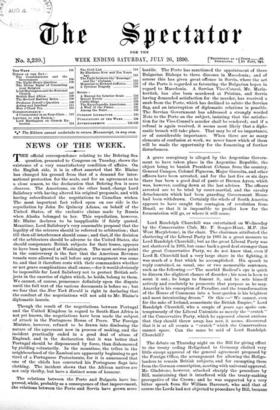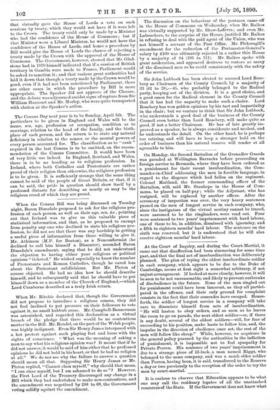The debate on Thursday night on the Bill for giving
effect to the treaty ceding Heligoland to Germany elicited very little except approval of the general agreement proposed by the Foreign Office, the arrangement for allowing the Heligo- landers to remain British subjects, and for exempting them from the German conscription, meeting with universal approvaL Mr. Gladstone, however, attacked sharply the procedure by Bill, maintaining that it interfered with the treaty-making prerogative of the Crown; and he was supported by a very bitter speech from Sir William Harcourt, who said that of course the Lords had not objected to procedure by Bill, because
that virtually gave the House of Lords a veto on such cessions by treaty, which they would not have if it were left to the Crown. The treaty could only be made by a Minister who had the confidence of the House of Commons ; but if that Minister were a Liberal Minister, he would not have the confidence of the House of Lords, and hence a procedure by Bill would give the House of Lords the chance of rejecting a treaty made by the Crown with the approval of the House of Commons. The Government, however, showed that Mr. Glad- stone had in 1870 himself indicated that if a cession of British territory in Gambia were made to France, Parliament would be asked to sanction it; and that various great authorities had laid it down that though a treaty made by the Crown would be good, even if it had not been sanctioned by Parliament, there are other cases in which the procedure by Bill is more appropriate. The Speaker did not approve of the Closure, and the debate was adjourned amidst signs of rapture from Sir William Harcourt and Mr. Morley, who were quite transported with elation at the Speaker's action.



































